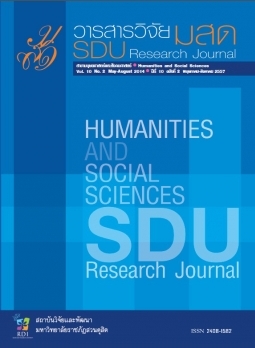Development of SCRIP Website with Automatic Fulfill System in Knowledge for Learners, Undergraduates' Computer Programming Principles Subject
Keywords:
SCRIP Website, Collaborative, Constructivist, Knowledge Automatic Fulfill SystemAbstract
The objectives of this research were (1) to design the SCRIP online learning model, (2) to develope an SCRIP website with automatic fulfill system in knowledge for learners, undergraduates' computer programming principles subject and to meet the 80/80 efficiency criterion and (3) analyzing satisfaction towards the SCRIP website. The research procedures consisted of four phases: (1) creation of the SCRIP online learning model using EFR research technic, (2) development of SCRIP
website with automatic fulfill system in knowledge for learners, undergraduates' computer programming principles subject, (3) analyzing the learning effectiveness and (4) analyzing satisfaction towards the SCRIP website. The sample group used in this research was technology and computer educator selected by purposive
sampling from Faculty of Education of Rajabhat Rajanagarindra University that were registered in computer programming principles subject in the first semester of academic year 25017. The research instruments used consisted of interview form, evaluation form and questionnaire. The data were analyzed by using percentage, mean, standard deviation and statistics employed for verifying the efficiency of SCRIP website were the E1/E2 index. The result findings were (1) SCRIP learning model consisted of three phases (1.1) collaborative learning (1.2) constructivist learning and (1.3) automatic fulfill the knowledge system that can respond to
difference in individuals level of knowledge. The results of the evaluation from experts was at a good level, with the average of 4.28 (2) website with automatic fulfill system in knowledge for learners, undergraduates' computer programming principles subject had efficiency indices of 81.54/82.30 and (3) The result of
analyzing satisfaction towards the SCRIP website was at a high level, with the
average of 4.23. The results of the research showed that the website with
Automatic Fulfill System in Knowledge for learners, undergraduates' computer programming principles subject based on SCRIP learning model was effective in the use of teaching.
References
“Fraction And Decimal” Between STAD Cooperative Learning With Metacognition Constructivist Theory Learning, And Teacher’s Handbook Learning of
Matthayomsuksa 1 Students. The Graduate School of Educational Research, Mahasarakham University, Bangkok, Thailand. Kamharnsoontorn, P & sangchan, W. (2016). Development of a Knowledgebase Website in Early Childhood
Education. Retrieved February 20, 2018, from https:// research.dusit.ac.th/new/upload/file/16685def4e530 90e57971433a25bddc0.pdf Khlaisang, J. (2011). Website Design Principles of Educational Theory into Practice. (Thailand Cyber University Project) Bangkok: Siamprint Company Limited. Kinshuk Petel, Ashok & Russell, David. (2002). Intelligent
and Adaptive System. In handbook on information Technologies for Education and Training. Edited
by Heimo H. Adelsberger; Betty Corris; & Jan M. Pawlowski. Berlin: Springer National Education Act B.E. 2542. (1999). Update (2) BE 2545 and (3) BE 2553 Retrieved June 19, 2015, from https:// www.mwit.ac.th/~person/01-Statutes/NationalEducation. pdf Poovarawan, Y. (2014). New Frontier of Learning : Education 4.0. Retrieved August 20, 2016, from http://www.stou. ac.th/Schools/sst/main/KM/KM%20Post/57/edu 4.0.pdf Retnowati, E., Ayres, P., & Sweller, J. (2017). Can collaborative learning improve the effectiveness of worked examples in learning mathematics?. Journal of Educational Psychology, 109(5), 666. Robert E. Slavin. 2003. Educational Psychology Theory and Practice. Boston: PEARSON 75 Arlington St., Suite 300, MA 02116 Simmatun. P. (2009). A Development of Web-based Collaborative Instructional Model Based on Constructivist Theory for Undergraduate Students. (Doctor’s dissertation). Bangkok: King Mongkut’s University of Technology North Bangkok. Songkram. N. (2007). The Development of a Knowledge Creation Model using Action Learning and Collaborative
Learning for Staff Members in Higher Education
Institutions: A Case Study of Faculty of Education. (Doctor’s dissertation). Bangkok: Chulalongkorn University. Suayroop. A. (2013). Educational Achievement in The Subject. Information About Computer Basics Students with One Year of Teaching, Group Collaboration using STAD. Retrieved August 29, 2016, from: http://pirun.ku.ac. th/~fedundl/upload/5210602443-2556-2-2.pdf. Sukavatee. P. (2007). A Development of The Social Constructivism Blended Learning Module for Enhancing Reading Engagement and English Reading Ability of Upper Secondary School Student. (Doctor’s dissertation). Bangkok: Chulalongkorn University.
Techatawewan, W. (2007). The Development of an Adaptive Web-Based Instruction on Dewey Decimal Classification. Bangkok: Srinakharinwirot University. Tiantong. M. (2013). Innovation: Computer-based Learning and Teaching. Bangkok: Danex Intercorporation
Company Limited.








